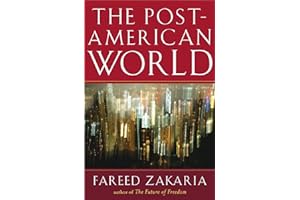One Sentence Summary:
This book discusses the shifting global power dynamics in the 21st century and argues that the United States will no longer be the sole superpower, paving the way for a more multipolar world.
Book Genre:
Non-fiction
Main Topic of the Book:
The evolving geopolitical landscape and the rise of new global powers in the post-American world.
Key Ideas:
- The United States has been the dominant superpower for the past century but is now facing challenges from rising powers like China, India, and Brazil.
- Globalization has led to interconnectedness and interdependence, making it difficult for one country to have absolute power.
- The world is moving towards a more multipolar system, where power is distributed among multiple players rather than dominated by one country.
- The US needs to adapt to this changing world and redefine its role to remain relevant and influential.
- The rise of new powers presents both challenges and opportunities for the world, including economic growth and potential conflicts.
Main Parts of the Book and a Short Summary:
Part I: The New World
This section discusses the shifting global power dynamics and how the rise of new powers will shape the future world order.
Part II: Brave New World
Here, the author explores the potential economic, political, and environmental implications of a multipolar world. He also emphasizes the need for cooperation and collaboration among nations to address global issues.
Part III: The Post-American Age
This section delves into the role of the United States in this new world and how it can adapt to maintain its influence and leadership.
Part IV: The New Post-American World
The final part of the book looks at specific regions and countries, such as China, India, and the Middle East, and their role in shaping the post-American world.
Key Takeaways:
- The United States will no longer be the sole superpower, and the world is moving towards a more multipolar system.
- Globalization has made it difficult for one country to have absolute power.
- The rise of new powers presents both challenges and opportunities for the world.
- The US needs to redefine its role and adapt to the changing world to remain influential.
- Cooperation and collaboration among nations are crucial to addressing global issues.
Author’s Background and Qualifications:
Fareed Zakaria is an Indian-American journalist, political scientist, and author. He has a Bachelor’s degree from Yale University and a PhD in Government from Harvard University. He is best known for his work as a foreign affairs columnist for The Washington Post and as the host of CNN’s flagship global affairs program, Fareed Zakaria GPS. He is also the author of several best-selling books on international relations and has been awarded numerous prestigious awards for his work.
Target Audience:
This book is targeted towards readers interested in international relations, politics, and global affairs. It is also suitable for policymakers, business leaders, and students studying these subjects.
Publisher and First Publication Date:
The Post-American World was published by W. W. Norton & Company in May 2008.

